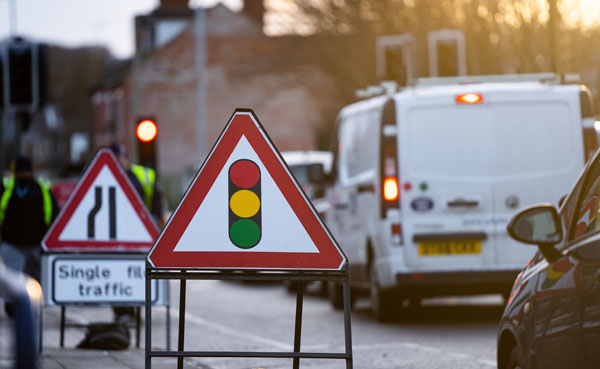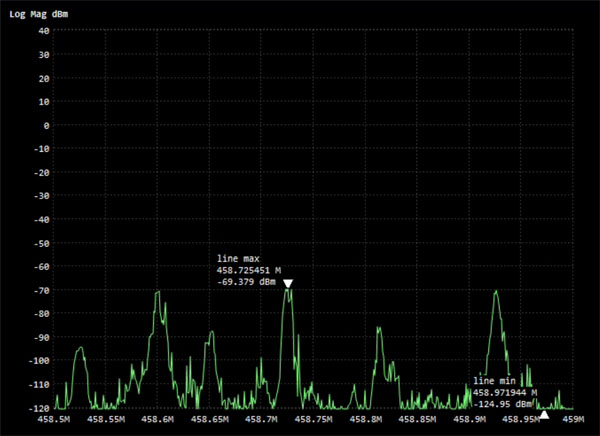Traffic Group Signals has made a breakthrough in a major safety issue for urban road safety, helping prevent temporary traffic signals from shutting down due to congested radio channels.
Even a common occurrence like people talking on walkie-talkies at a nearby construction site could cause a radio signal to become jammed and temporary traffic signals to shut down completely or go ‘all red’ - resulting in a serious road safety concern.
Building on over four years of research and development, Traffic Group Signals has boosted the performance of its active channel management (ACM) technology by observing patterns in radio use to identify peak and off-peak usage and times where spikes are likely to occur.

‘The team performed a spectrum analysis at a challenging test site to discover that 75% of the available 458MHz radio band was in use daily by other services. This equates to 11 unusable channels in a 15-channel radio system or 23 unusable channels in a 32-channel radio system,’ the company said in a statement.
‘This new data was used to expand the capabilities of the ACM system, allowing the technology to overcome channel conflict by self-monitoring patterns using the 458MHz band over an extended period and automatically remembering which channels to avoid.’
Since upgrading the technology, Traffic Group Signals said it had 'experienced flawless communications between lights at one of the team’s most challenging sites in central London'.
This latest enhancement to the ACM technology is initially being rolled out by Traffic Group Signals across Metro Pro and Evo1 Pro enabled systems throughout 2023.
Dr Darren Hudson, senior projects manager at Traffic Group Signals, told Highways: ‘It seems utterly bonkers that there is not a dedicated radio band for traffic signals doesn’t it? Unfortunately, any changes to the radio use would need to be lobbied to Ofcom – which would take considerable time and resources – and would require all manufacturers to update the radio hardware in their equipment, which I’m not sure there is any appetite to do.
‘This would benefit future use but would mean there are tens of thousands of signals in active deployment that are unable to use the new channel - you are not able to tune signals, they are normally fixed on a band - so the problem would not go away overnight.
‘Ofcom also regulates the power output for traffic signals, so we are fairly limited to our 458MHz band and can be knocked out by unregulated higher-power site radios. You could remove the power cap and blast over every other radio user, but this is going to lead to other problems and does not make traffic signals friendly neighbours to other service users.
‘Signal failures tend not to occur in rural areas, where there are fewer radio users. As you move into urban areas or perform work near construction sites, it can be a common problem. It is not unusual for a site in London to fail multiple times during the day as the different radio channels become occupied at different times.’
Picture from Traffic Signals Group.

Traffic Group Signals has designed the ACM to work within the confines of Ofcom and the 458Mhz band.
It has been engineered to work alongside other radio users and avoid channels used by nearby traffic lights.
Dr Hudson said: 'Radio technology is certainly not ideal but we hope that with our latest development to our patent pending technology we have overcome the majority of issues we are likely to face out on site.’
Radio-linked temporary traffic signals rely on a strong radio connection to operate. If the radio link between signals fails, and the signal goes to 'all red' or gives no lights at all, it creates an unsafe site.
Dr Hudson said: 'In a lot of cases, drivers will just wait it out, try and avoid the roadworks or proceed and potentially cause a blockage. This can get out of hand very quickly and impact the surrounding road network and critical infrastructure. Local authorities receive a lot of complaints regarding roadworks and failed equipment, which can lead to fines for traffic management companies.
‘Non-ACM enabled signals will remain in these fault conditions until an operative attends the site to restart the system. With ACM, the signals will commence a recovery programme, attempting to restart themselves over an extended period. In some cases, the ACM system can be recovered before any meaningful impact is caused.’
In many cases permit conditions require a person on-site to respond to issues without delay but it is also typical for an operative to set the desired radio channel when configuring the temporary system, monitor the lights for a period to see if they are operational, and then leave for the next job. However, a quiet channel in the morning could be congested by the afternoon.
‘Our ACM system automatically selects the clearest channel and will actively monitor and hop to the clearest channel throughout the day,’ Dr Hudson added.





